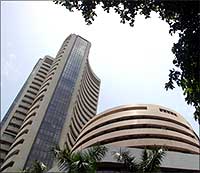 The markets continued their good showing for the fifth consecutive session to end higher by more than a percent on the back of a drop in food inflation.
The markets continued their good showing for the fifth consecutive session to end higher by more than a percent on the back of a drop in food inflation. The Sensex ended at 18,506, higher by 205 points and the Nifty ended comfortably above the crucial 5500 mark at 5546, up 64 points.
The midcap index ended at 6793, higher by 58 points and the smallcap index shut shop at 8321, up 74 points.
The markets had started the day on a muted note in line with the cues from the global front and the subdued nature of the previous day's proceedings.
Wall Street had risen marginally on Wednesday on stronger-than-expected Dell earnings and a flurry of deal news, but concerns about tensions between Israel and Iran gave investors reason to pause.
The Dow had gained 36 points and Nasdaq had risen 12 points in overnight trades, while the Asian stocks had a mixed opening.
Moreover, the benchmark indices had a lacklustre Wednesday on account of the Eid holiday and three consecutive days of gains had added 4.6% to the benchmark index.
The bourses back home, however, charted an independent course from thereon.
The Asian counterparts exhibited mixed trends in view of the simmering tensions in the Middle East, with the Hang Seng and Nikkei featuring among the gainers and the Seoul, Straits Times and Taiwan registering a negative close.
And the European markets lacked a sense of direction, with the benchmark indices in London, France and Germany pottering around the previous day's closing levels, in mid-day trades.
But our markets picked up momentum mid-way through the session to scale new intra-day highs with every passing hour and close at the high point of the day, with the easing in food inflation boosting the interest-rate sensitive banking and auto stocks.
The food inflation eased to a two-month low in early February on moderating prices of onions and other vegetables, amid expectations the government may announce fresh measures to boost productivity for key staples in the upcoming budget.
The food price index rose 11.05% and the fuel price index climbed 11.92% in the year till February 5, government
In the previous week, the annual food and fuel inflation stood at 13.07% and 11.61% respectively. The primary articles price index was up 14.59% in the latest week, compared with an annual rise of 16.24% a week earlier.
The Finance Minister Pranab Mukherjee expressed confidence the food inflation would soon come down to single digits.
"I hope by March, we are able to reach overall inflation of 7%," he said. And the Planning Commission Deputy Chairman Montek Singh Ahluwalia also forecasted continuation of the declining trend and claimed that the spike in food prices witnessed during December and January has been contained.
Banking shares rallied on the bourses after the latest government data showed that food inflation eased early this month and the government decided to infuse Rs 2,155 crore (Rs 21.55 billion) into four public sector banks, including UCO Bank, Dena Bank, Vijaya Bank and United Bank of India, as part of recapitalisation package to shore up their equity capital.
The BSE banking index Bankex spurted by more than a percent compared to a 1% rise in the Sensex.
HDFC Bank spurted by 4.1% at Rs 2183 and HDFC soared 3.1% at Rs 649, and in the mid-cap banking space, IOB soared by 5.1% at Rs 135, IDFC zoomed by 5% at Rs 145 and Indian Bank added 3.2% at Rs 221.
In fact, the Bankex has outperformed other indices in the last one week, gaining more than 10% compared to a 6% rise in the benchmark Sensex.
Among the other significant gainers, Tata Steel raced ahead by 2.1%, extending Wednesday's jump of 3.97%, after its consolidated net profit surged 112.21% to Rs 1003.02 crore on a 8.91% rise in total income to Rs 28985.12 crore in Q3 December 2010 over Q3 December 2009. And index heavyweight RIL added 1% at Rs 953.
On the other hand, Wipro slipped by 1.3% at Rs 431 to emerge as the top loser on the BSE. ONGC shed 0.6% at Rs 277 and Jindal Steel lost 0.5% at Rs 666.
The market breadth was positive.
Out of 2986 stocks traded on the BSE, there were 1611 advancing stocks as against 1126 declines.











 © 2025
© 2025